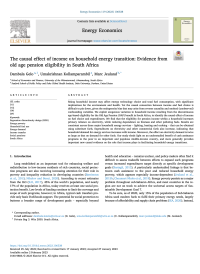Journal Article - February 2023
The causal effect of income on household energy transition: Evidence from old age pension eligibility in South Africa
Rising household income may affect energy technology choice and total fuel consumption, with significant implications for the environment and health. Yet the causal connection between income and fuel choice is difficult to pin down, given the endogeneity bias that may arise from reverse causality and omitted (unobserved) confounding variables. We exploit exogenous variation in household income resulting from the discontinuous age-based eligibility for the Old Age Pension (OAP) benefit in South Africa, to identify the causal effect of income on fuel choice and expenditures. We find that the eligibility for pension income within a household increases primary reliance on electricity, while reducing dependence on biomass and other polluting fuels. Results are consistent across three major household energy services – lighting, heating and cooking – that can be obtained using substitute fuels. Expenditures on electricity and other commercial fuels also increase, indicating that household demand for energy services increases with income. Moreover, the effect on electricity demand is twice as large as that on demand for other fuels. Our study sheds light on an understudied benefit of cash assistance programs to the poor in an important and populous middle-income country, and more generally provides important new causal evidence on the role that income plays in facilitating household energy transitions.
